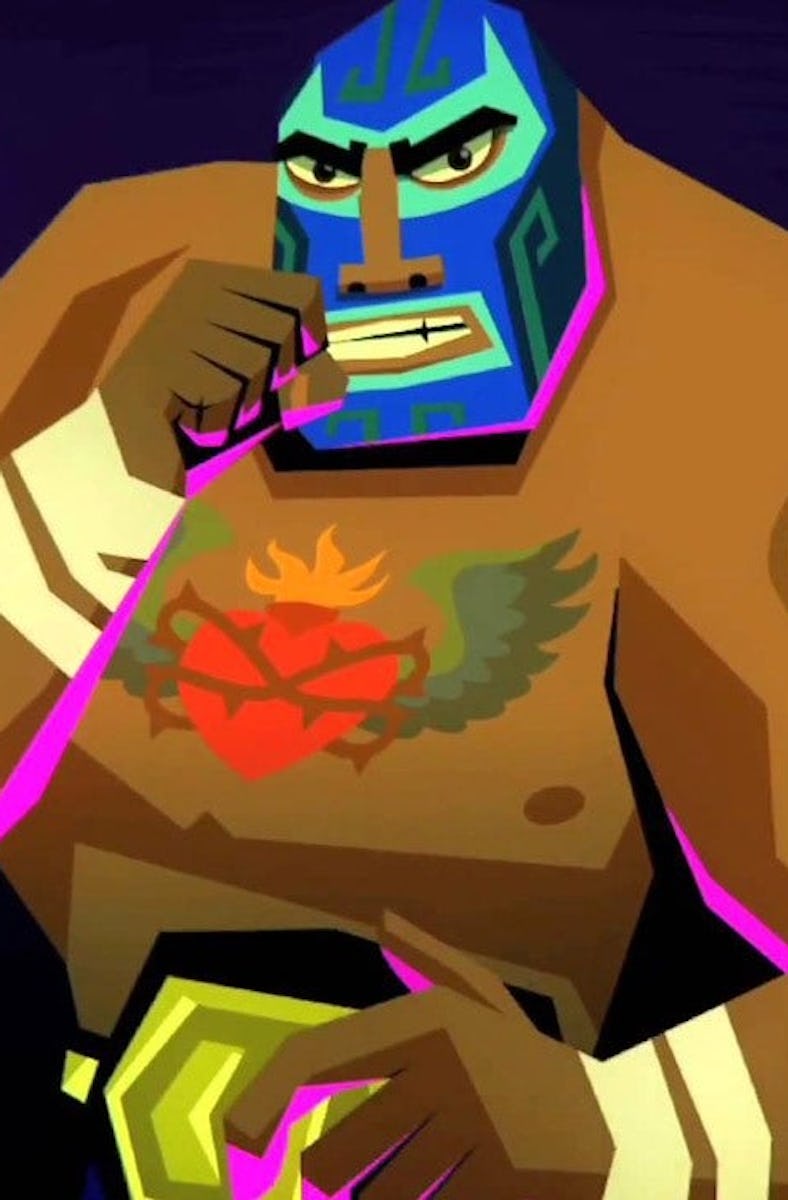10 Years Ago, An Ode to Mexican Wrestling Changed Indie Games Forever
One of the best games of its generation.

Fusion is complicated. Just look at the sun. Taking different elements and combining them into something new requires tremendous pressure but generates tons of energy. This is true for video games, too. Game developers try to blend genres and styles to create something fresh and balanced. It doesn’t always work, but when it does? A star is born.
Such was the case in 2013 when Guacamelee! released on PlayStation 3. A nesting doll of love-letters to Mexican culture, professional wrestling and classic video games, Guacamelee was a triumph of game design and artistic vision. And, like most great indie games, the path to success did not come easy.
DrinkBox Studios was born from the ashes of Pseudo Entertainment, a Toronto-based indie studio best known for the car combat series Full Auto. The studio shut down in 2008 when Eidos Interactive pulled out of a deal to develop a new Carmageddon-style game. And while Toronto is a major hub for indie development these days, 15 years ago the scene was different. Despite a lack of options three members of Pseudo Entertainment, Graham Smith, Ryan MacLean and Chris Harvey decided to pick up the pieces and found a new studio that would enable them to go another direction. Thus, DrinkBox Studios was born.
This didn’t immediately translate into making whatever they wanted, because money. The fledgling studio grew its roster and used its talents to assist other, larger studios with various projects as a way to develop their reputation. It worked. In 2010, Sony partnered with the studio as DrinkBox developed their first game, Tales from Space: About a Blob, for the PlayStation 3.
Tales from Space: About a Blob was a success for two reasons. The most obvious is that it was well-received by critics earning a respectable 76 on Metacritic. Reviewers were especially taken by the art style, foreshadowing one of the main draws of Guacamelee. More importantly for DrinkBox, the game proved the studio had the ability to fund, develop and launch a game in-house. Sony was pleased, and agreed to work with them on their next venture. Now it was time to figure out what that would be.
DrinkBox found its humor early on, as evidenced by the crumpled cans of “Hipster Juice” in About a Blob.
In a post-mortem presentation on Guacamelee, co-founder Chris Harvey explained DrinkBox learned three lessons from About a Blob that would inform this process. First, the game had to have “immediate appeal” that people could understand quickly. They also wanted some of those people to be hardcore gamers, so the new concept needed to be more sophisticated. The last piece was a practical takeaway, the concept and design had to be complete before production began.
The team began discussing concepts for their next game as they finished development on About a Blob. With those three principles in mind, an open-door pitch process allowed employees to submit their own one-page pitch for a new game. The seed for Guacamelee came from concept artist Augusto Quijano, who was inspired by his own Mexican heritage. Everyone agreed the style and influences were superb, but they wanted something more than just a straightforward brawler. Perhaps something with a little ‘Vania in it?
It was no easy task. There was a lot of debate among the team as to whether they were doing too much. A brawler was too boring, but adding parallel worlds, Metroidvania-inspired level design and attacks that doubled as platforming techniques meant there was a lot to pin down before production could begin. They knew they couldn’t waste too much time fiddling with mechanics or else it would hurt other aspects of production.
Just like pro wrestling, Guacamelee relies on black-and-white morality for its heroes and villains.
They knew what they wanted to make, but paradoxically couldn’t immediately make whatever they wanted. Because money. They managed to get a grant from the Canadian governmént which allowed them to survive long enough to negotiate (and re-negotiate) deals with both Sony and Microsoft. After balking at a lowball offer, DrinkBox ended up going with Sony after it became evident there was too much red tape involved with getting into the Xbox 360 marketplace. This would later prove to be a big loss for Microsoft. Why? Because money.
Guacamelee was a resounding success. It was the top downloaded game on PS3 and Vita when it debuted in April 2013. Demand drove it to Xbox and Nintendo. The only consistent criticism people have is that it is simply too short, a testament to the vibrant world, tremendous gameplay and fantastic writing. Everyone seemed to want more adventures with hero Juan Aguacate, his beloved Lupita and nefarious skeleton god Carlos Calaca.
They got it, too. An expanded Super Turbo Championship edition with added content for the first game as well as a whole-ass sequel in 2017, Guacamelee 2. Will it become a trilogy? Time will tell (it’s not “off the table”) but every wrestling fan knows you can’t have a proper finish without a 1-2-3.